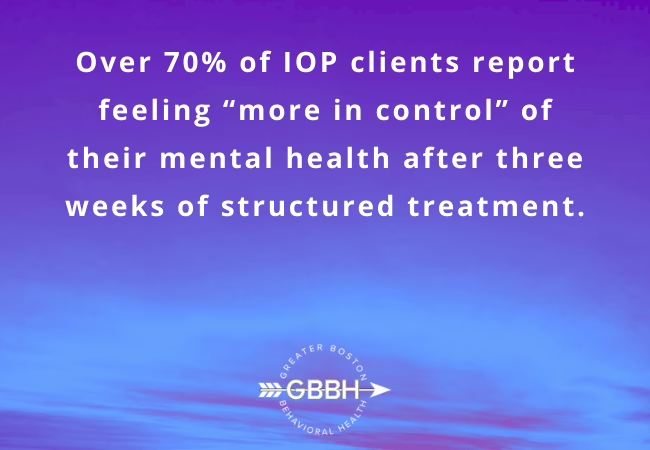Navigating mental health recovery or substance use treatment can be overwhelming—especially when you’re unsure what level of care is right for your needs. While inpatient treatment provides 24/7 care and outpatient therapy offers weekly sessions, many people fall somewhere in between.
That’s where Intensive Outpatient Programs (IOP) come in. Designed to provide structured support while offering flexibility, IOP bridges the gap between traditional outpatient therapy and full-time hospitalization.
At Greater Boston Behavioral Health, our Intensive Outpatient Program in Massachusetts empowers individuals to heal, grow, and reclaim their lives—without putting everything on hold. In this blog, we’ll break down exactly what IOP is, how it works, who it benefits, and how it fits into the broader mental health care continuum.
What Is an Intensive Outpatient Program?
An Intensive Outpatient Program (IOP) is a form of structured, non-residential treatment that provides multiple hours of clinical support each week—typically 3–4 hours per day, 3 to 5 days a week. Clients receive focused therapeutic care while continuing to live at home and manage personal responsibilities like work, school, or parenting.
IOP is ideal for those who need more than weekly therapy but don’t require the 24/7 structure of inpatient or partial hospitalization programs in Massachusetts.
What Does IOP Include?
At Greater Boston Behavioral Health, our IOP in Massachusetts is built around evidence-based, trauma-informed care and includes:
1. Group Therapy (Core Component)
Group sessions offer a safe, supportive space where clients learn, share, and grow together. Topics may include:
- Cognitive Behavioral Therapy (CBT)
- Dialectical Behavior Therapy (DBT)
- Relapse prevention
- Trauma processing
- Mindfulness and emotional regulation
- Communication skills
- Anger management therapy in Massachusetts
Group therapy allows participants to gain insight from others while practicing interpersonal skills in real-time.
2. Individual Therapy
In addition to group work, clients receive weekly one-on-one therapy. This time is focused on:
- Addressing personal trauma, grief, or life challenges
- Processing events discussed in group
- Setting recovery goals
- Identifying triggers and relapse patterns
- Tracking progress
Our therapists use modalities tailored to your needs, including CBT, EMDR, and strengths-based approaches.
3. Psychiatric Evaluation & Medication Management
Mental health conditions often benefit from medication. IOP includes access to:
- Psychiatric evaluations and diagnoses
- Medication initiation or adjustments
- Side-effect monitoring
- Dual diagnosis care for mental health and substance use
At our mental health treatment center in Massachusetts, we ensure medication management is collaborative and personalized.
4. Life Skills & Psychoeducation
Long-term recovery requires strong foundations. IOP includes daily education on:
- Stress management
- Healthy routines and sleep hygiene
- Boundaries and assertiveness
- Time management
- Building support systems
- Crisis planning and safety strategies
5. Family Therapy and Support
Mental health and recovery are not individual journeys—they impact families too. IOP often includes:
- Family counseling sessions
- Education on mental illness and recovery
- Communication skill development
- Rebuilding trust and roles
This is especially helpful for clients transitioning from a residential treatment program in Massachusetts or those seeking family reintegration.
What Conditions Does IOP Treat?
Our mental health programs in Massachusetts support a wide range of diagnoses, including:
- Anxiety disorders (GAD, panic disorder)
- Major depression
- Bipolar disorder
- PTSD and complex trauma
- Borderline Personality Disorder (BPD)
- Obsessive-Compulsive Disorder (OCD)
- Substance Use Disorders
- Dual Diagnosis (mental illness + addiction)
- Behavioral issues requiring anger management therapy in Massachusetts
Each client receives a personalized treatment plan designed to match their clinical needs and goals.
How Does IOP Fit Into the Continuum of Care?
Mental health recovery often involves transitioning through multiple levels of support. Here’s how IOP compares:
| Program | Level of Care | Commitment | Best For |
|---|---|---|---|
| Inpatient Treatment Program | Highest | 24/7 residential care | Acute psychiatric crisis or medical detox |
| Partial Hospitalization Program (PHP) | High | 5–6 hours/day, 5 days/week | Post-crisis stabilization or step-down from inpatient |
| Intensive Outpatient Program (IOP) | Moderate | 3–4 hours/day, 3–5 days/wk | Continued recovery support with flexibility |
| Outpatient Therapy | Low | 1–2 sessions/week | Maintenance care or mild, stable symptoms |
Our team helps clients move fluidly between levels as their needs evolve—starting with inpatient, then PHP, then IOP, and finally traditional outpatient care.
Who Benefits Most from IOP?
You may benefit from an Intensive Outpatient Program in Massachusetts if:
- You’ve completed a partial hospitalization program in Massachusetts or residential treatment and are ready for more independence
- You’ve tried traditional outpatient therapy but need more frequent support
- You’re managing a relapse or flare-up of symptoms
- You have work or family obligations that make inpatient care impossible
- You’re dealing with co-occurring mental health and addiction issues
- You need a structured routine with the flexibility of living at home
A Sample Day in Our IOP
| Time | Activity |
|---|---|
| 9:00 AM | Morning check-in & mindfulness |
| 9:30 AM | Group therapy (CBT or DBT-based) |
| 11:00 AM | Life skills or psychoeducation group |
| 12:00 PM | Individual therapy or medication check-in |
IOP may be scheduled for mornings, afternoons, or evenings depending on client availability—making it one of the most flexible mental therapy programs in Massachusetts.
Why Choose Greater Boston Behavioral Health?
As a trusted mental health treatment center in Massachusetts, we’re committed to creating personalized, flexible treatment experiences. Here’s what sets us apart:
- Trauma-informed, evidence-based care
- Seamless coordination between PHP, IOP, and outpatient services
- Access to anger management therapy in Massachusetts and specialized care tracks
- LGBTQ+-affirming, inclusive environment
- Skilled clinicians, psychiatrists, and case managers
- Strong focus on transition planning and aftercare
Whether you’re stepping down from inpatient treatment or stepping up from weekly therapy, our IOP helps you stabilize, grow, and move forward.
What Comes After IOP?
Once IOP is completed, we guide you through the next phase, which may include:
- Weekly outpatient therapy
- Psychiatric medication management
- Peer support groups and alumni programs
- Return to school or work with support
- Ongoing family therapy or community reintegration
Every discharge from IOP comes with a personalized aftercare plan to ensure continuity and prevent relapse.
Conclusion
Whether you’re transitioning from our Partial Hospitalization Program in Massachusetts, leaving a hospital stay, or just looking for more support than traditional therapy provides, IOP may be your ideal next step. You don’t need to choose between your life and your recovery. At Greater Boston Behavioral Health, our Intensive Outpatient Program in Massachusetts helps you stay connected to what matters most—while receiving the care you deserve. Call us today at 888.278.0716 to request a confidential consultation.
FAQ on Intensive Outpatient Program
What is the main goal of an Intensive Outpatient Program?
An IOP provides structured therapy and clinical support several days a week while allowing individuals to live at home. It’s ideal for those who need more care than weekly therapy but don’t require inpatient treatment.
How many hours per week is IOP?
Most IOPs run 9–15 hours per week, typically split across 3–5 days with 3–4 hours of daily programming, including group and individual therapy.
Is IOP suitable for dual diagnosis?
Yes. IOP is highly effective for individuals managing co-occurring disorders such as depression and substance use. Our program at Greater Boston Behavioral Health offers integrated dual diagnosis treatment.
How is IOP different from PHP?
PHP is more intensive—usually 5–6 hours per day, 5 days a week—while IOP offers more flexibility at 3–4 hours a day. PHP often follows inpatient treatment, while IOP is typically a step-down from PHP.
What conditions can be treated in IOP?
IOP addresses anxiety, depression, PTSD, bipolar disorder, substance use, and behavioral issues. We also offer anger management therapy in Massachusetts as part of our IOP track.
Can I work or go to school during IOP?
Yes. One of IOP’s primary advantages is flexibility. Our scheduling options are designed to accommodate work, school, and family responsibilities.
Is IOP covered by insurance?
In most cases, yes. Our admissions team can verify your benefits and help you navigate the approval process for our mental health programs in Massachusetts.


